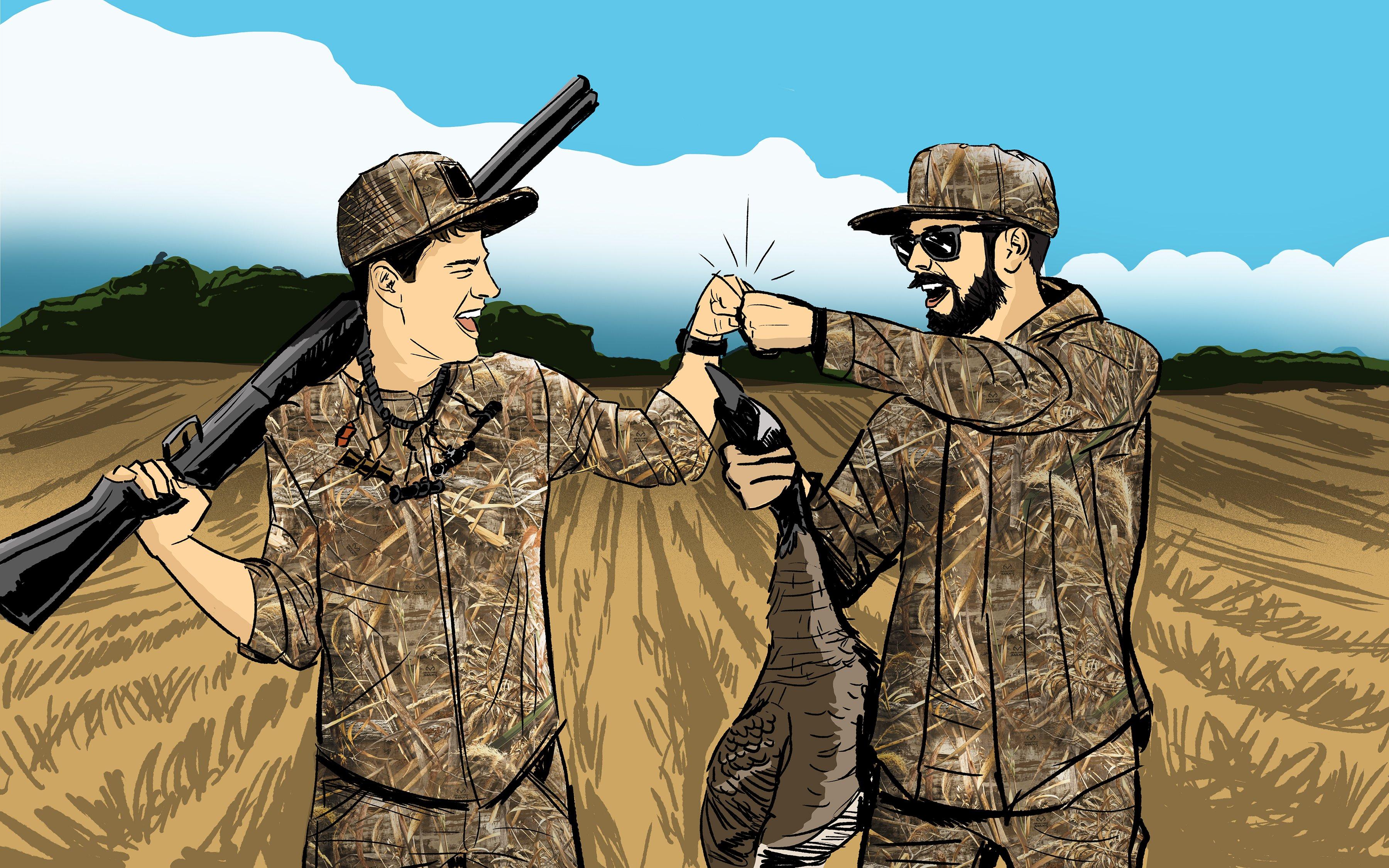The next generation is shaping the future of waterfowling — and in some pretty good ways
Ten of us lay in a cut milo field in the middle of America. Forty-five minutes earlier, our group had plunged hundreds of staked-out socks and silhouettes into the ground while a mixed playlist of rap and Southern steel guitar country rock anthems reverberated across the prairie, keeping us working hard to prepare the rig for the big flights of lesser Canada geese, specklebellies and straggler snows that had not yet made it to Arkansas.
Massive, spinning flocks of dark geese churned into the spread, and each time the call to kill them came, it was a struggle to find a goose to shoot. That wasn't because there weren't plenty of birds in range. The youngsters next to us were just so darn fast to sit up and shoot that it was tough to keep up. It took only a few flocks to get our birds. By 9 a.m., every decoy was back in the trailer.
We were the old men on that hunt, my brother said as the truck rumbled over the cattle guard and onto the two-lane highway. That's hard to swallow in your late 30s, but he was right. Those hunters were younger, faster, better versions of us. You don't hear many folks say that about Millennials (minus younger folks, of course). Many see the generation as lazy and entitled; more interested in Instagram than paying dues. But in waterfowling, nothing could be farther from the truth — if you look past social media. Sure, that rule has exceptions, and no, there's no data to suggest 20- and 30-somethings are shifting duck hunting for better or worse. That will only be known decades from today. But I have field experience from almost a decade of travels across the four flyways that prove the kids are passionate about this sport and invested in its future.
Early Teal Tenacity
In Illinois, some of the best public-land hunts occur during September for blue-winged teal. There's strong competition, and you must wake up early to get the best spots. This past year, I scouted a walk-in area the night before the season and encountered a group of high-school and college students doing the same.
The next morning, I was up at 2 a.m. and to the wetland by 3 a.m., but the youngsters already had decoys set and were ready for sunrise, which was still more than three hours away. They shot almost a six-man limit and returned the next day for more. I tried arriving even earlier to get the best stake because a buddy was coming along, and I wanted to make sure we put a few birds on the strap. The youngsters' group had grown by a few more hunters (they likely heard of their buddies' exploits from the opener), and they were already throwing decoys. We learned one or two of them had spent the night in the truck to make sure they had the best hole again.
That same morning, two more teenagers hiked more than a mile down the levee past us to a corner that had no water but where Canada geese had been flying routinely. About 8:30, a flock came off the roost, and the teens started blowing short-reeds like they were in the two-man honker contest at Easton, Maryland. They shot like champion clays shooters and killed five or six birds. Then they lugged 40 pounds of geese in a sled back across the levee, taking turns in 90-degree heat, sweating through Neoprene waders.
I get a good chuckle from old guys at boat ramps or blind draws who think this generation is ruining hunting. I relay those tales and more of Millennials showing true grit: grinding it out all day in a cold pit for one Canada goose with two college students, or battling a 2-foot chop with waves crashing over a layout boat on a 10-degree morning off the North Shore of Long Island. I could go on.
No More Splainin'
I always enjoy chatting with or spending a morning in the marsh with female duck hunters. It's enjoyable because most are far better spoken and worldly than the guys with whom I spend fall. (No offense, boys; I still love those fart jokes.) There's no man-splaining in our conversations, mostly because I tried to run the show once and the group of women I was hunting with almost laughed me out of the blind. Man-splaining means when a man pours all his wisdom into a woman he believes needs it. Lemme show ya how to shoot a shotgun, blow a duck call or back the trailer up. Ugh.
Actually, Millennial women often epitomize some of best qualities waterfowlers should have. In my experience, they are extremely communal. They want you to be successful and have fun while you hunt without judgment, which is awesome. If you screw up in a party full of men, there's zero chance you'll live that mistake down.
The female duck hunters I've been around didn't base a good day in the blind solely on killing ducks. It was more about enjoying one another's company. No one tried to be the best caller or have her dog make the longest retrieve. And it wasn't all prim and proper. Those ladies could teach most men a thing or two about foul language.
Social Conscience
Millennials are hunting in an era that society has never seen. Our parents didn't grow up hunting in a digital age, and the platforms on which to discuss the many nuances of hunting on a broad scale did not exist.
Social media provides a great arena for communication and engaging with others in the hunting community, but it also gives people who work tirelessly against hunters more opportunities to skew the perception of our sport.
All kinds of bogus social posts taint duck hunting, and this generation needs to curb that. Images of hunters holding ducks in their mouths and videos of camo-clad bros shooting from the riverbank as their buddies throw bunches of dead birds from the sky to mimic a massive rain-out damage duck hunting and fuel antis. Someday, we might have to win over non-hunters to keep our sport alive, and that kind of media will not help our cause.
The Millennial generation must be more cautious about how it showcases hunting. If non-hunters perceive our sport as reckless and disrespectful to the animals we love to chase, the results could become an ugly reality.
Click here for more Realtree waterfowl hunting content. And check us out on Facebook.








